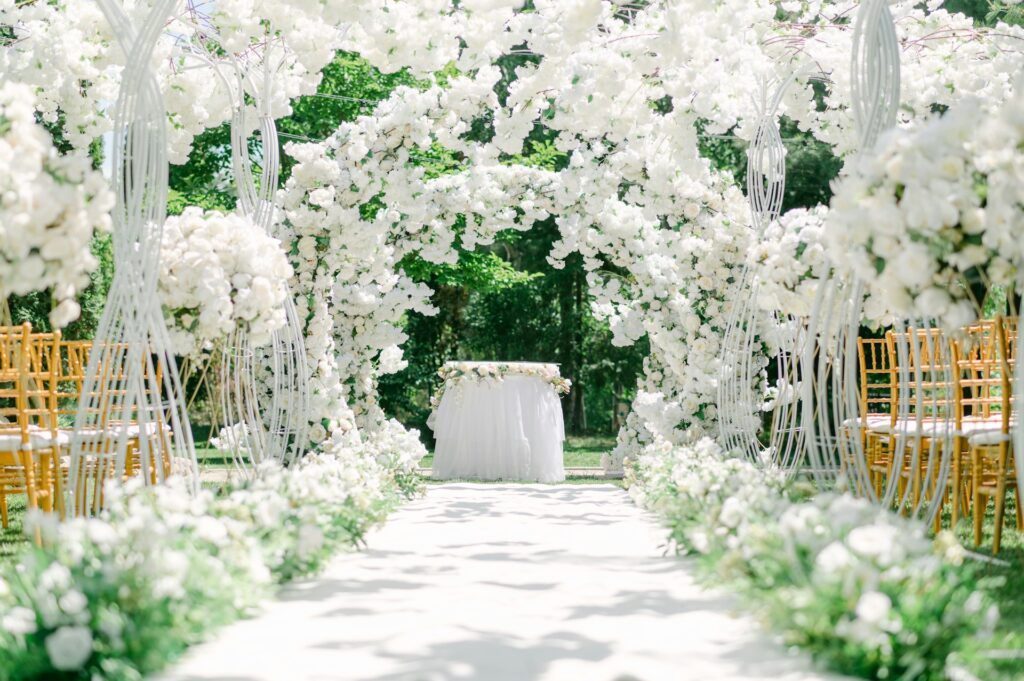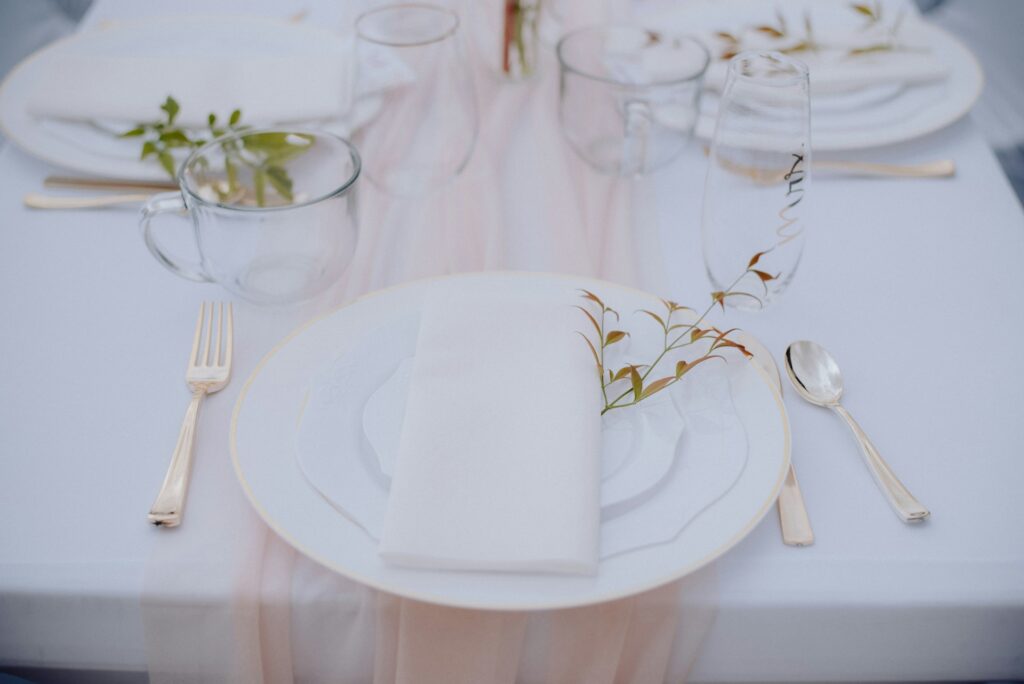Selecting the ideal wedding venue is one of the most important choices you’ll make when planning your big day. The right location sets the tone for the entire event, aligning with your vision, budget, and guest experience. With so many wedding venues available, narrowing down the options can feel overwhelming. This guide offers tips and essential considerations to help you confidently choose the perfect setting, while making sure it’s a match for your wedding ceremony outline and overall theme.
1. Define Your Wedding Vision and Style
Before diving into the search for wedding venues, take time to envision the style and atmosphere you want for your wedding. Knowing whether you’re dreaming of a rustic barn, elegant ballroom, or modern rooftop ceremony can streamline the selection process.
- Consider the Theme and Tone: Traditional, bohemian, vintage, or contemporary? Each theme lends itself to different types of venues. For example, vineyards and gardens are excellent for a rustic or romantic theme, while a sleek downtown loft may suit a modern wedding.
- Outdoor vs. Indoor: Decide if you want your ceremony or reception outdoors, which is common for summer weddings, or if you prefer the comfort of an indoor setting. Consider the weather and have a backup plan for outdoor weddings.
2. Determine the Budget

Your budget is a crucial factor that affects every aspect of your wedding. Wedding venues often take a large portion of the budget, so knowing how much you can allocate is essential.
- All-Inclusive vs. À la Carte: Some venues offer packages that include catering, decor, and setup, while others provide just the space. All-inclusive venues can simplify planning but may cost more. If your budget is tight, an à la carte option allows you to bring in your vendors, potentially reducing costs.
- Seasonal Pricing: Some venues have different rates depending on the season, with prices often higher in peak wedding months (like summer and early autumn). Opting for an off-season date or a weekday wedding can save you money.
3. Consider Guest Capacity and Comfort
The size of your guest list will play a significant role in venue selection. Each venue has a maximum capacity, so choosing a space that comfortably accommodates your guest count is important for the overall experience.
- Guest List First, Venue Second: Create a rough guest list before visiting venues to ensure you choose a space that won’t feel cramped or too empty.
- Spacing Needs: Some weddings require additional space for elements like dance floors, cocktail hour, and seating arrangements. If you have a specific wedding ceremony outline that includes a reception with several components, confirm that the venue layout can accommodate all of these elements.
4. Check the Venue’s Availability
Popular wedding venues are often booked up well in advance, especially during peak season. Securing a venue early in the planning process can help ensure you get the location and date you want.
- Flexible Dates: If your wedding date is flexible, you’ll have more venue options to consider. However, if you’re set on a specific date, start your search as soon as possible.
- Touring Venues: Seeing the venue in person can provide insights you might not get from photos. Touring on the same day of the week and time of day as your event can give you a better idea of lighting, space, and overall atmosphere.
5. Assess the Location and Accessibility
The venue’s location can affect your guests’ experience and impact the logistics of your wedding day.
- Proximity to Accommodations: If your guests are traveling from out of town, select a venue near hotels or arrange for group lodging options. Consider if the venue provides shuttle services or if guests will need to drive.
- Parking and Accessibility: Confirm that the venue has ample parking, especially if it’s in a busy area. For guests with mobility challenges, check whether the venue has ramps, elevators, or other accessible features.
6. Evaluate On-Site Services and Amenities
Many wedding venues come with on-site services that can simplify your planning process and elevate the event experience.
- Catering and Bar Services: Some venues offer in-house catering, which can make it easier to manage the menu. If the venue allows outside caterers, consider whether you’ll need extra space for food prep.
- Equipment and Decor: Ask if the venue includes essentials like tables, chairs, and linens or if you’ll need to rent them. Some venues provide in-house decor or have preferred vendors for florals, lighting, and AV equipment.
- Wedding Coordinator Services: Venues that offer an in-house coordinator can help with timelines and logistics on the wedding day, reducing your stress. If a venue includes this service, they can assist in adhering to your wedding ceremony outline.
7. Review the Venue’s Atmosphere and Ambiance

The aesthetic appeal of your venue is essential to creating your desired wedding experience. Each venue has a unique ambiance, from historical charm to modern elegance.
- Natural Lighting: Lighting impacts the overall atmosphere and photography quality. If possible, visit the venue at the same time of day as your planned wedding to assess the natural lighting.
- Decor Flexibility: Some venues have strict decor policies, so verify that you’ll be able to personalize the space according to your theme. If candles, open flames, or hanging decorations are important to you, confirm that they’re allowed.
8. Understand Any Restrictions and Rules
Many wedding venues have specific rules and regulations, so clarify any restrictions before making your final decision.
- Noise Ordinances and Curfew: Some venues have noise restrictions or early curfews, especially outdoor or residential area venues. If you’re planning a lively reception with dancing, ensure the venue’s policies accommodate this.
- Outside Vendors: Some venues require you to use their preferred vendors for services like catering, bartending, and DJ. If you have particular vendors in mind, confirm they’ll be allowed to work at the venue.
9. Think About Logistics for the Wedding Ceremony Outline
If you’re planning to hold both the ceremony and reception at the same venue, consider the logistics of transitioning between the two.
- Separate Ceremony and Reception Spaces: If the venue offers both indoor and outdoor areas, you may have the flexibility to use one for the ceremony and another for the reception. This arrangement can help guests enjoy different settings and create a seamless flow.
- Space for Pre-Ceremony Prep: If your wedding ceremony outline includes pre-ceremony photos, ensure there are dressing rooms or prep areas for the wedding party. Many venues provide a bridal suite or groom’s room where the couple and their entourage can get ready.
Conclusion:
Choosing the right wedding venue involves balancing practicality with your personal style and preferences. By clarifying your vision, budget, and specific needs such as adhering to your wedding ceremony outline, you’ll be able to narrow down the options and make an informed decision.
More Reading






